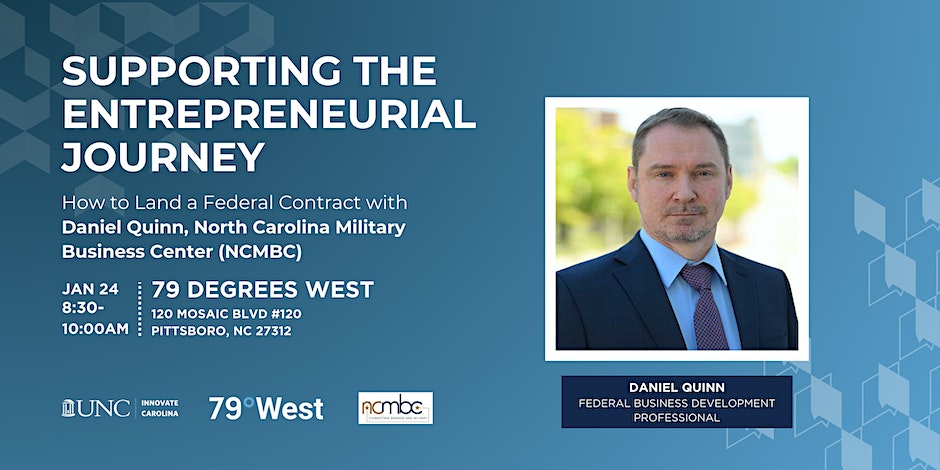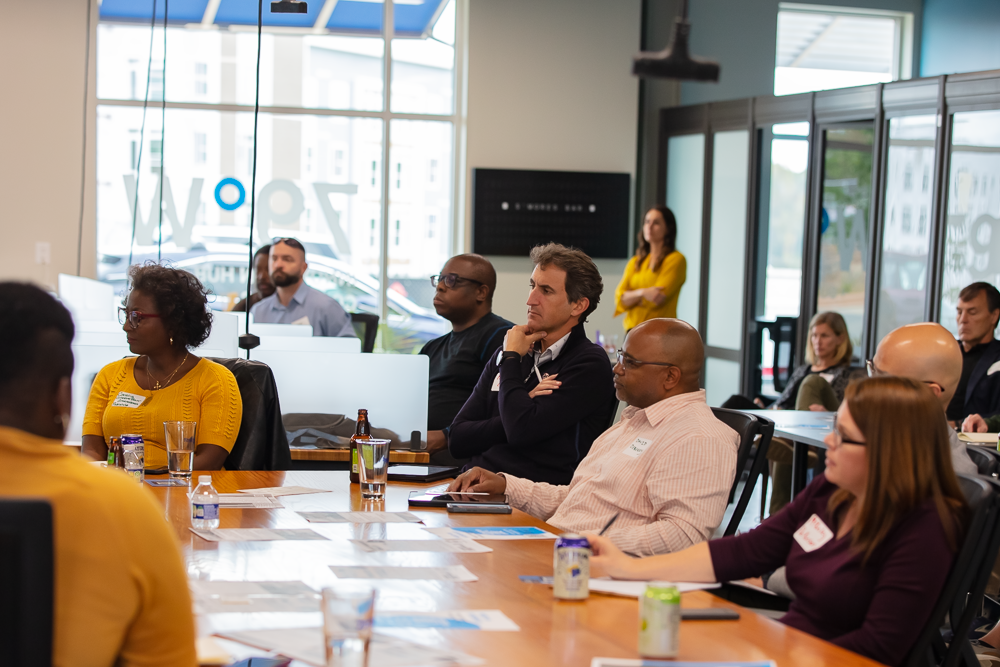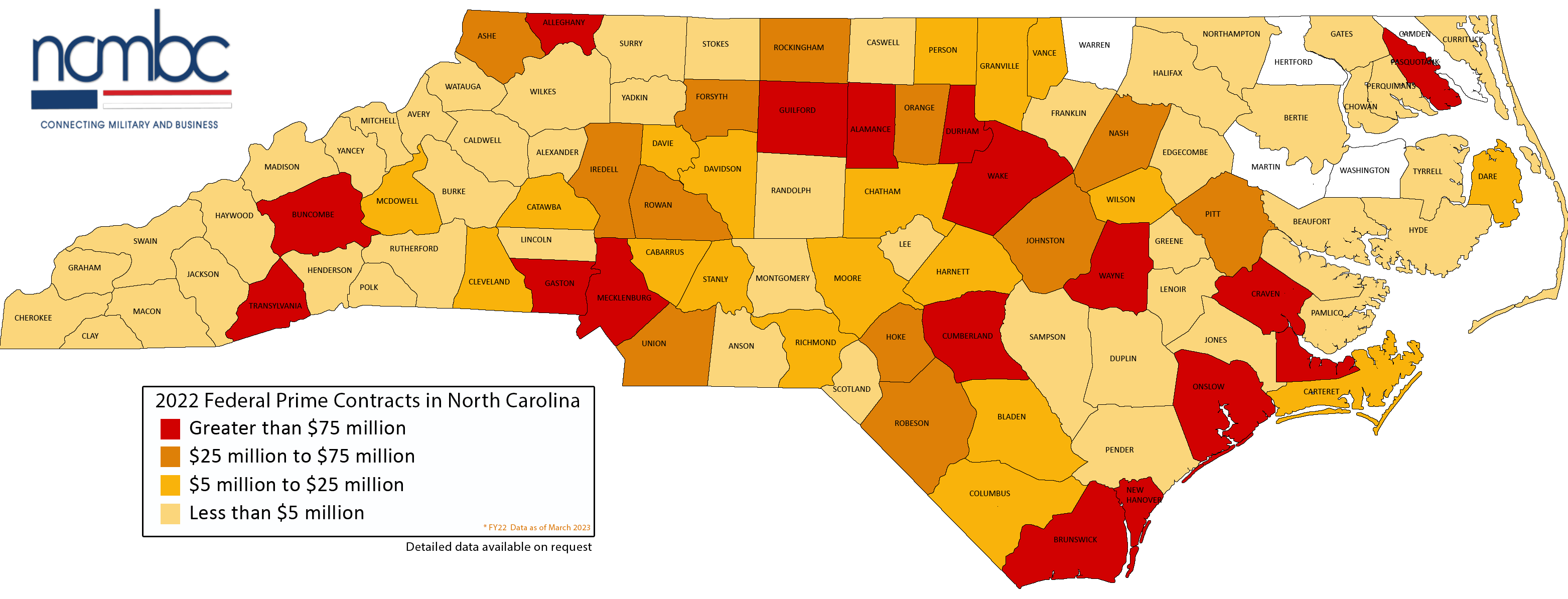

Did you know that there are more than 53,000 contract opportunities with the federal government? Or that in fiscal year 2022, $8.9 billion in federal prime contracts were awarded to companies in 95 of 100 North Carolina counties. Or that companies in 77 of 100 counties in the state landed $5.5 billion in Department of Defense prime contracts? The federal government and its military bases purchase all kinds of products and services—including many that might surprise you.

Like Daniel Quinn from the North Carolina Military Business Center (NCMBC), said, “If you have it in your home town, they have it on a military base.” And you might be surprised at the many different products and services the federal government buys—perhaps including those sold by your own company.
Join Quinn, a federal business development professional for NCMBC, as he leads the workshop called “How to Land a Federal Contract” hosted by Innovate Carolina at the 79°West Innovation Hub in Pittsboro. If you have a small business with products to sell or services to provide, you’ll get advice from Quinn that you can use to navigate the federal purchasing process. Here’s a preview of a few lessons you’ll hear him share that can help you and other small business owners take the next step in working with the federal government.
The North Carolina Military Business Center (NCMBC) works with companies that want to do business with the federal government. The sweet spot is a company that has been established for a couple of years that has a product they want to sell or service that want to provide. We work with businesses and put them in contact with the right people. If you don’t speak the language of federal contracting, it can be a hard place, and people feel like they can’t get anywhere—like there are walls they keep running into. So, we’re here to break down those walls. Everyone in the organization is prior military, prior Department of Defense, or a prior federal agency employee.
Our DEFTECH (North Carolina Defense Technology Transition Office) team focuses on innovation and works with companies that have new technology products— these can include anything from med-tech to technologies for the warfighter. We teach businesses how to navigate the federal SBIR grant program, and we also conduct a lot of outreach on their behalf. The DEFTECH team is extremely knowledgeable, and every Friday they set up coffee calls with speakers and breakout sessions to walk people through the process.
The NCMBC is a state entity. We are embedded in the community college system, and it is a free service. We are here for people and businesses in North Carolina to use at no cost. We have technical experts, including 27 business development professionals across North Carolina who are tied to the community colleges. We work closely with the chambers of commerce and innovation hubs.
Wondering how your company could do business with the federal government? Attend this free workshop guided by Daniel Quinn of the North Carolina Military Business Center. You’ll learn how the federal government buys products and services, tips for marketing your business, how to register as a federal contractor, and how to identify and respond to federal business opportunities.
Register for workshop
A number of the large corporations tell us what types of capabilities they are looking for—for instance, they might need a small machine shop to help them with something specific—and then we work to make connections in our network to tie those organizations together. We are here to get businesses into the federal government, but if we can help put people to work and connect businesses in other ways, we absolutely do that.
The workshop is an introduction to federal contracting, and it walks people through the process: how the government buys things, where they look, the different certifications that the government looks for. The workshop guides people on where and how to get those certifications. This session is geared toward someone who knows that federal contracts exist, but is perhaps confused by the process or doesn’t know how to get started. We walk them through and show them how.
One piece of advice we share with anyone trying to work with the federal government is to work as a subcontractor for someone else. As an example, we work with a lot of construction companies that specialize in roofing or plumbing. Rather than trying to win the big contract themselves, they can work as subcontractors. We show them the website where they can see every federal contract, go through the online repository to identify companies that have already won large contracts, and find a point of contact for those companies to reach out to. We also explain all the set-asides that the federal government is required to put in place to help small business win contracts and how to get the required certifications.
We provide information about how to use NCMBC’s product called MatchForce, which is free. If you only look in the federal database called System for Award Management (SAM), you see every contract that the federal government issues every day, which is thousands and thousands of contracts. That can be overwhelming. But, if you go through MatchForce, you can build a custom profile, and the system feeds you only the types of contracts you want to see.
We work with a lot of trades and construction businesses. We also work with recreational-type companies that create things like jewelry, woodworking, playground equipment or picnic tables. People often say, “I have a small business, but I don’t think the federal government works with companies like mine.” And I tell people all the time that a military base is like a city. Anything that you have in your town is on the base.

One of the biggest misconceptions about contracting with the federal government is when people contact me and say, “I’m a veteran. What contract do I need to get?” It doesn’t work that way. I think there is a misconception that if someone has a veteran-owned business that there is a contract just waiting for them. If you are coming to the federal government to try to save your business, you’re making a mistake. If you’re coming to the federal government, and that is the only business avenue that you’re trying to explore, you’re making a mistake. You can come in and win a lucrative contract right out of the gate. The problem is that you’re probably not going to win it next time because that’s just how the system works.
The big light-bulb moment is that a lot of people don’t realize how many types of things the federal government purchases. It includes all types of products to different services—even services like school counseling for students on military bases or tax preparation services. If you have it in your home town, they have it on a military base.
Want to get advice from other founders or entrepreneurial experts that can help your business?
Check out upcoming Founders Forum sessions in Chapel Hill, Pittsboro and Wake Forest. The Founders Forum is a series of founder-led talks hosted by Innovate Carolina, UNC-Chapel Hill’s university-wide initiative for innovation, entrepreneurship and economic development. Embrace the imperfect entrepreneurial journey as we delve into tales of triumph and missteps, as startup leaders share their victories and openly discuss their pitfalls.